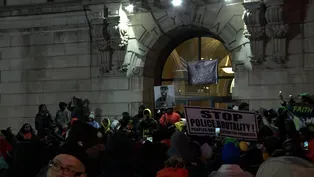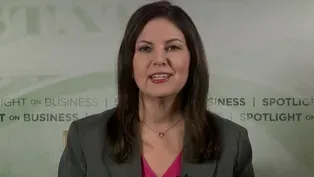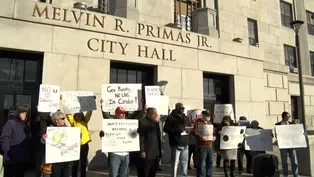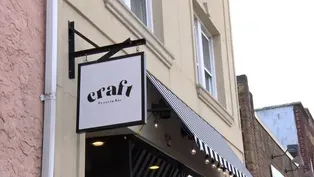NJ Spotlight News
Jung-Brier-interview
Clip: 3/8/2023 | 5m 27sVideo has Closed Captions
Reporters Taylor Jung and Bobby Brier speak on violence intervention programs
Reporters Taylor Jung and Bobby Brier speak on violence intervention programs after the police killing of Najee Seabrooks in Paterson. Seabrooks was a part of the city's violence intervention team.
Problems with Closed Captions? Closed Captioning Feedback
Problems with Closed Captions? Closed Captioning Feedback
NJ Spotlight News is a local public television program presented by THIRTEEN PBS
NJ Spotlight News
Jung-Brier-interview
Clip: 3/8/2023 | 5m 27sVideo has Closed Captions
Reporters Taylor Jung and Bobby Brier speak on violence intervention programs after the police killing of Najee Seabrooks in Paterson. Seabrooks was a part of the city's violence intervention team.
Problems with Closed Captions? Closed Captioning Feedback
How to Watch NJ Spotlight News
NJ Spotlight News is available to stream on pbs.org and the free PBS App, available on iPhone, Apple TV, Android TV, Android smartphones, Amazon Fire TV, Amazon Fire Tablet, Roku, Samsung Smart TV, and Vizio.
Providing Support for PBS.org
Learn Moreabout PBS online sponsorshipWell the death of Najee Seabrooks is just the latest calling into question what if any role police departments should play in responding to mental health crises.
Governor Murphy recently pledged 10 million dollars to expand a program pairing police with mental health experts in those situations but community activists question if that's the right approach in preventing deadly encounters.
Social justice reporter Taylor Jung and mental health writer Bobby Brier have been digging into this issue and join me now to discuss.
Taylor ,I know you were also at the rally last night what can you tell me about the context behind what we're hearing from these advocates?
Because this is not the first time an incident like this has happened, in fact that's why these street teams exist.
What's really pushing their demands we'll call them.
I think um it's a lot of pain honestly and trauma from an over-policed community that's driving a lot of what they're asking for and as you mentioned these are requests that have been decades in the making um especially since the Civil Rights movement.
Some of them are creating community-based and non-carceral uh crisis response teams that don't involve law enforcement part of what advocates are saying is just that the mere presence of law enforcement can exacerbate a situation and maybe re-traumatize you know Black and brown communities that again have experienced a lot of police violence.
And another important one that they brought up was the civilian complaint review board that's one of the ones that's been in the making since probably the 1960s.
This is a independent body of civilians that would be able to review cases of police misconduct as well as has subpoena power in order to gather more information.
And that's just one that's not been able to move forward in the state legislature.
I'm thinking back to even just a year, two years ago, where calls to defund the police, abolish the police, were really the through line.
We don't hear that so much now we did not hear that last night from these advocates.
Is it that they see a place for law enforcement in these incidents and and what is it in their mind?
I think that they see the expansive you know multi-billion dollar police budgets and say how can we invest that money instead in community-led programs, public safety programs that is.
And I think it still is a part of the calls that they're you know that they were making last night maybe not as explicitly um as the defund the police like hashtag and what not but I think that they want to see that investment and they still don't want law enforcement involved in some of these mental health crises calls.
Bobby, are police equipped to handle mental crisis interventions in this way?
So the number of sources that I've spoken to about this they have said that police throughout the state are required to go through a training that does just that to de-escalate uh mental health crises uh now there's been a number of folks that have also said that this training does not go far enough, pointing to instances throughout the state and and to what recently happened.
So there's certainly laws on the books requiring uh police officers to go through this training whether or not that training is implemented into each to police department and each county is dependent upon many times the police chief and the county themselves.
So that's what I have learned thus far as it relates to that and as it relates to uh the expansion really with this ARRIVE Together program.
Yeah I mean with ARRIVE Together we're going to see that in more municipalities.
Is this something from your reporting that's welcomed by law enforcement?
We've heard over the years that a lot of these officers feel like they're not qualified or that they're being tasked with items that quite frankly their training hasn't equipped them to do.
A number of law enforcement officers that I spoke with have welcomed the idea to essentially say that they are in many situations better equipped when they're with a mental health clinician or a mental health therapist who can de-escalate a situation.
To Taylor's point though, many advocates have also spoken about the fact that they would rather not have police involvement at all when somebody's experiencing a mental health crisis.
There's a number of models that many folks point to throughout the country uh one of which many sources have told me is almost a gold standard at this point, is one out of Oregon that is completely civilian-led or people-led when somebody's experiencing a mental health crisis they do not involve the police at all.
And in addition to that another one that has gained national recognition is one out of Denver, Colorado called the STAR program also a completely civilian-led response that many people have pointed to as a way for violence intervention that does uh violence intervention and harm reduction that does not involve police in any way yeah.
Yeah and of course the unfortunate irony here is that Paterson has a violence intervention team of which Mr. Seabrooks was a part of.
Bobby Brier, Taylor Jung thank you so much.
Thank you.
Thank you.
[Music]
AG alleges NJ towns discriminated against LGBTQ+ couples
Video has Closed Captions
Clip: 3/8/2023 | 1m 16s | Violations announced against 28 municipalities for discriminatory marriage license forms (1m 16s)
At vigil for man killed by Paterson police, calls for action
Video has Closed Captions
Clip: 3/8/2023 | 5m 35s | Najee Seabrooks was fatally shot in a standoff with police (5m 35s)
Business Report: New jobs data
Video has Closed Captions
Clip: 3/8/2023 | 2m 49s | ADP says US economy created 242,000 new jobs in February (2m 49s)
Protesters rally against proposed LNG terminal
Video has Closed Captions
Clip: 3/8/2023 | 4m 15s | Protesters urge Camden City Council to oppose the project slated for Gibbstown (4m 15s)
Student entrepreneur opens a cafe with a twist
Video has Closed Captions
Clip: 3/8/2023 | 4m 13s | Kamily Flores, first-generation college student, opens Craft café in Cranford (4m 13s)
Providing Support for PBS.org
Learn Moreabout PBS online sponsorshipSupport for PBS provided by:
NJ Spotlight News is a local public television program presented by THIRTEEN PBS















